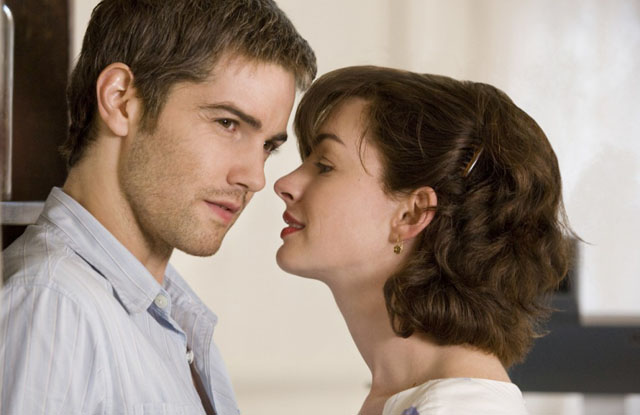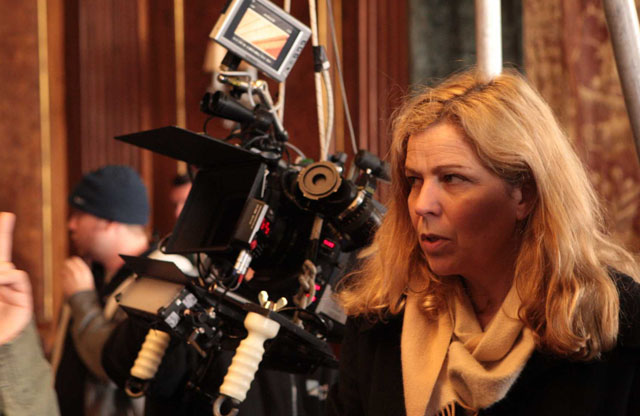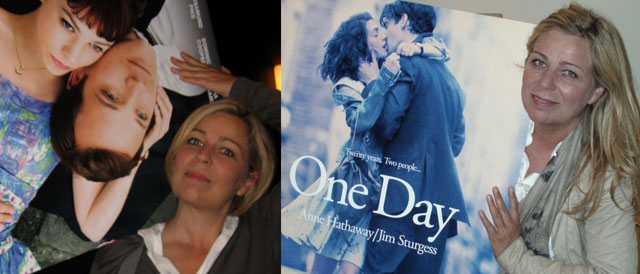CHICAGO – Patrick McDonald of HollywoodChicago.com appears on “The Morning Mess” with Dan Baker on WBGR-FM (Monroe, Wisconsin) on March 21st, 2024, reviewing the new streaming series “Manhunt” – based on the bestseller by James L. Swanson – currently streaming on Apple TV+.
Interview: Lone Scherfig Directs Anne Hathaway in ‘One Day’
CHICAGO – Director Lone Scherfig has a rare delicate touch when it comes to portraying the subtlety of human relationships in films. After a triumph in 2009 directing Carey Mulligan in “An Education,” Scherfig returns with Anne Hathaway in the new film “One Day.”
Again, Lone Scherfig is a Danish director guiding an American actor (Hathaway) as a British character (she similarly worked that way with Peter Saarsgard in An Education). Both films feature women in transition having to do with relationships, but in One Day the story is as much about the male lead (Jim Sturgess) as Hathaway’s character.
The title One Day refers to July 15th, the designated day that Emma and Dexter (Hathaway and Sturgess) get together through the years from their college days to middle age. In that interim they experience many stages of their relationship, coming in and out of their coupling in various degrees of importance. Scherfig creates a connection between them that seems inevitable, but life is what happens when they’re busy making other plans.
 Photo credit: Giles Keyte for Focus Features |
This is Scherig’s second interview with HollywoodChicago.com. I noted that she likes to take distinct pictures with her film posters, so she accommodated me again, after this intuitive interview.
HollywoodChicago: You are taking a love story and turning it into a different direction, one of reflection and a soul’s attempt to purify itself when things change. What attracted you to David Nicholls’ story that made it appropriate for your style of directing?
Lone Scherfig: When I first start reading the script, I liked the characters, the jokes and the idea of checking in on them once a year. But it wasn’t until I reached page 75 when I was overwhelmed and moved and realized it was something I wanted to do. I remember Jodie Whittaker, who plays Tilly in the film, she was reading the script on The Tube in London, and when she got to that point she said ‘NO!” really loud in front of everyone. During the period that period where people in London were reading the book, there would be that reaction all over the place. It becomes very emotional, and the theme changes. And that is what I liked.
HollywoodChicago: With this film and ‘An Education,’ it feels like you’re formulating a series of films about women falling in love in different times and circumstances. What fascinates you about how and why women fall in love? What, in your observation, is the difference between men and women in that connection?
Scherfig: I thought Emma’s [Hathaway] insecurity is important in this film, all the detours that she takes because he self esteem is so low. She is the first in her family to go to university, and she is hard-boiled as she is because she lacks confidence. That was very sweet, to have a character like that. Growing into a woman that lands on both feet and finds out what she likes, and starts to respect herself over the years. That I thought was a worthy cause.
But it is Dexter [Sturgess] that I’m more interested in, and I probably would have answered something similar as to who interested me the most in ‘An Education.’ It was the villain, David [Peter Sarsgaard]. Dexter isn’t a villain, but he is much more complex and undergoes through a bigger drama. And so I think where David Nicholls has written a book where he has so much affection for Emma, and portrays Emma very well, I think the film tends to be more Dexter’s story. And I think that Jim Sturgess does a phenomenal job.
HollywoodChicago: Again also, you are a Danish director guiding an American who is playing a Brit…
Scherfig: [Laughs] Yeah, that’s not a very good cocktail, is it?…
 Photo credit: Kerry Brown for Sony Pictures Classic |
HollywoodChicago: No, it works! What was the difference between how Saarsgard and Hathaway approached the challenge, and who seemed more conscious about how they embodied it?
Scherfig: They are not that far apart in accessing character and I think in both cases they would have been a little inspired by the British way of acting, where you find your way to the character through the way they talk. American method tradition is to find the character within yourself, while the British tradition is to find it outside yourself. It seems to be a fruitful combination, and I think in Anne’s case it may be that she didn’t have to be overemotional, but more craft oriented and more technical. She’s so experienced, and a very good craftsman. It’s a good combination that she practices both techniques, and she invests so much time in her work, in order to be behind every line and do her very best. She has a really high work ethic and it’s all about the result and character.
HollywoodChicago: Jim Sturgess seems like one of the purest and nicest actors rising above the show business fray. How did you guide him to the depths of playing a 42 year old, given all the circumstances of his character’s life. How did he find that older soul?
Scherfig: He just doesn’t have that big of an ego. He is one of those actors who is inspired by what is surrounding him and when he played opposite Anne, a lot of it was to act with her and the way he cares for her. So I think some of it comes from trusting that the moment will give what he needs once his research and physical preparation is done, which included the helpful make-up. Anne and Jim would sit in the make-up room every morning and adjust to the scene and the period together. They would sit in the chair and see the physical change, and that helped them to whatever age they were playing.
HollywoodChicago: I am interested on how you handle the sex scenes in One Day and An Education, there seemed to be much more respect for the woman’s side of the equation, then you see in other films. I was wondering if you approach it differently with women actors, being that you are a woman director?
Scherfig: I wouldn’t know. [laughs] The only thing I can tell you is that I had read an interview with a Danish actress whom I’ve worked with on several films. When the journalist asked her what she wasn’t good at, straight away she said sex scenes. I thought to myself maybe I should work on those scenes. [laughs]
With Jim and Anne, they are so confident in their own skin, that the only challenge would have been if they didn’t like each other at all. And I know that for me the sensuality is more important than how much you see of the body. I can look the actors in the eyes and promise that we won’t see anything that they don’t want to show. What I generally mean that in this kind of film, the power of suggestion works. That’s a genre issue, because I might do a film where they need to be much more exposed.
HollywoodChicago: There are lessons in this movie about never taking love for granted. When a break up occurs, and that special love is given up by either party, what factors do you believe determines a regret for that loss later?
Scherfig: Because it’s a love story, you just based the plot on the fact that they do love each other more than other people. Because dramatically, it’s tricky to understand why suddenly Dexter cannot live without Emma. And because of the nature of the film, when you check in on them every July 15th, there are big turning points in their lives that you don’t see. There is a very important night where there was too much drinking and more sex that we didn’t see, which clearly influences Dexter. The fact was for Emma that he’s suddenly there for her, that makes her rewind the film in her head and decide to act.
 Photo credit: Patrick McDonald for HollywoodChicago.com |
HollywoodChicago: Your bio on IMDB says that you’ve called ‘Wilbur Wants to Kill Himself’ your most complete work. Have you surpassed that yet, either with the subsequent films or in anticipation of what’s coming up next?
Scherfig: Now there are seven films, and it’s more personal, has more logic and is more simple than the other films. It’s also like the neglected child, because so few people saw that film that I love it more.
HollywoodChicago: What historical events in your lifetime influences your filmmaking? Given the social and cultural changes from the time you were born to now, what are you most grateful for in being born in your generation and period in World History?
Scherfig: I was young in a time and place where it was very liberated, and there was free access to education. I could choose whatever I wanted and do whatever I wanted. That I can see now is a huge privilege. My parents generation still had the shadow of World War II, which gave them high ethics and they fought for values that were a lot less materialistic. I want to make sure that doesn’t disappear from my life, now that a new generation is becoming more influential.
HollywoodChicago: What elements and colors have stayed with you from Danish Film School days to ‘One Day’? What is the prime directive that has stayed with you in your attitude as a filmmaker from your student days?
Scherfig: Because of the nature of One Day, where you have so many locations and so many different stylistic inspirations, the director of photography and I really used classic film craft, but then combined it with something much more spontaneous. There are scenes where you have two hand-held shaky cameras in order to get authenticity and other scenes where there are much more classic, equipment heavy and planned, epic style. One facet of my job is to make all these eclectic types of film vocabulary to work as one organic creature. And that started in my film school days.
One of the reasons I did like Wilbur so much is that it was right after my Dogme95 days [’Italian for Beginners’], it was like going back to playing the full piano rather than just the middle of the keyboard. One Day was a fantastic challenge to find solutions that felt right for each of the 20 little films that this one film consists of, and it was enjoyable because I felt like all the experiences from all the old commercials, television and films I had done previously was all necessary, in order for the film to work and be cinematic.
 | By PATRICK McDONALD |


